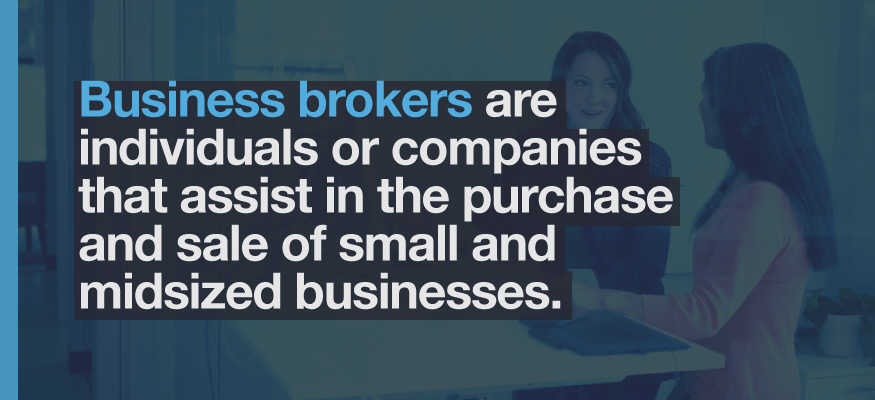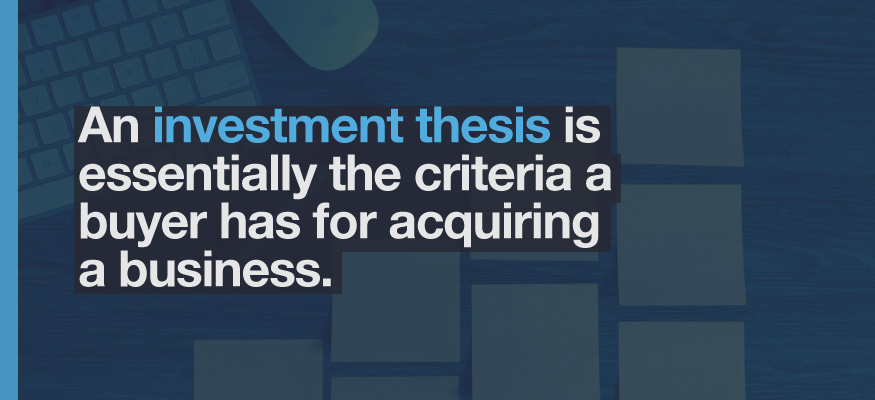- Why a qualified business broker is so important on your entrepreneurial journey.
- How to find and connect with brokers.
- Why location is an important aspect of your investment thesis.
- How to build trust and rapport with brokers so they send you deals first.
- How to identify unqualified brokers.
Finding a business to acquire is hard. Any advantage you can find over other budding buyers can mean the difference between finding a great company quickly and wallowing in pre-acquisition hell for an indefinite amount of time.
One of the biggest gatekeepers you’ll encounter in that process is a business broker.
As Pat Jones writes on the BusinessBroker.net blog, “A business broker is somewhat similar to a realtor. Some states require a business broker to have real estate licenses, and most get licensed anyway so they can sell property and write leases.”

On the surface, business brokers are individuals or companies that assist in the purchase and sale of small and midsized businesses. But for our Acquisition Entrepreneurs, accessing brokers to find deals is one of the biggest pain points.
All of our Acquisition Entrepreneurs will have to deal with a business broker at some point. In fact, a lot of our training is focused on finding the right brokers and disqualifying the bad ones. But every once in a while, one AE sets themselves apart. When it comes to finding brokers and developing a relationship with them, that person is Kathy.
In an ideal world, brokers will send deals to buyers before those deals are made public. Kathy has set new records within the Acquira community for receiving deals ahead of their public listings. It’s a success rate that Kathy attributes to an attention to detail and an ability to listen.
Introducing Kathy
Kathy and her husband Phil live in the Capital Region where he works for the Pentagon. She runs her own small business and they take care of their six adopted special needs children.
Kathy has worked in Human Resources for a number of large organizations while her husband works in the military and has an MBA in finance. As her husband nears retirement, the couple started to look at their options.
“There's only three military bases that can take us because of the complex, special needs that [our kids] have,” says Kathy. “We just felt like it was time to be able to get out and not have to worry about more deployments.”
For Kathy and her husband, the thought of being able to step away from the rigidity of the military offered a lot of upside. It was a way for them to take control of their lives and plan for the future.
“We're treating our business as our future retirement, knowing that the exit plan is hopefully in 10 to 15 years,” she says. “So taking all that into consideration, we felt that the acquisition of a business just made sense to us.”
More Than Just An Investment Thesis
As anyone who’s started the process of finding a business knows, creating an investment thesis is integral.

For the unaware, an investment thesis is essentially the criteria a buyer has for acquiring a business. It’s a list of things that the buyer has defined as important, as non-starters, and as red flags. The investment thesis helps a buyer focus their search and serves as a filter for deals.
For their investment thesis, Kathy and her husband looked for home services businesses that were recession-resistant and mainly located in the Southern United States. That could include Tennessee, Georgia, Virginia, the Carolinas, and more. The fact that Kathy’s family is so tied to the military meant that they were fairly open when it came to location.
Or so they thought.
The couple became particularly interested in a home services company in the Flagstaff, Arizona area. On paper, the business made complete sense and matched their investment thesis perfectly. It got to the point where Kathy was ready to submit an LOI (Letter of Intent) and start the acquisition process. But something began to nag at her.
Kathy’s son is one of five people in the world with a very rare heart condition. She decided to check with her son’s cardiologist to see if the elevation of Flagstaff would be a problem.
“He finally got back to me the very next day and what did he say? Absolutely not,” Kathy explains, about why they couldn’t live there.
After that, the couple realized that they needed to look at more than just a business’ bottom line when considering an acquisition target.
“We have six kids that we have to think about,” she says. “So the businesses that we're looking at have to involve family because we're very family-focused. Always in the back of our mind, wherever we move to it has to be beneficial for the whole family, not just because it makes economic sense or it's a great investment.”
Hear Kathy explain the whole story here:
Finding A Small Business Broker
Once the couple realized that their investment thesis included certain geographic restrictions, finding a good business broker became even more important.
Buyers should begin their broker search on large listing sites like BizBuySell or IBBA. After that, they can begin to drill down into brokers’ personal sites, rather than just filling out anonymous forms.
In the beginning, Kathy says she started out like most people. She signed on to BizBuySell, found something she liked, and clicked ‘contact broker.’ A process that she calls a big mistake.
“Of course I was not getting any success,” she says.
Connecting With Brokers
Finding a good deal takes more than just typing “small business broker near me” into a search engine. One way to narrow your search criteria on a site like BizBuySell is by location. You select the area where you want to search and you’ll be presented with a list of deals. It’s as easy as finding a three-star restaurant on Yelp in a new neighborhood.
This step was important for Kathy, given the very specific needs of her family. But it would take more than a simple location filter for her to find truly helpful brokers.
Once Kathy had the names of brokers she thought looked interesting, she began her Google sleuthing, looking up their names and numbers; their LinkedIn profiles; their business’ direct websites. It was all fuel she could use to build a stronger, more personal relationship with them.
When looking for brokers, it’s important to remember, don’t forget the little guys. Kathy is adamant about this facet of her success. Many of the big brokerages don’t have time to dedicate to every marginally interested buyer. But the small-town firms often come with a certain amount of small-town charm that allows for a more personal relationship.
Standing Out From the Crowd

But an Andy Griffith wave and a Leave It Beaver smile still isn’t enough to guarantee that any broker will dedicate extra time to you as the buyer. After finding little success, Kathy realized that if she wanted to stand out from the crowd, she needed to sell herself.
“What I did was I sat down and I wrote up a short paragraph blurb to describe who I am, what we're looking for, and how financially feasible we are. Basically, I explained we're not just kicking tires, we're in it to win.”
She then started looking in specific cities where they knew they wanted to live and began reaching out to brokers in those areas. She would make a list of business brokers and send them all the blurb she’d written about her family.
The secret to the blurb was to keep it short, according to Kathy. Many of these brokers are busy or otherwise distracted, so something that can grab their attention and not waste their time is very helpful.
“That seemed to really get us in the door,” explains Kathy.
Once Kathy was satisfied with her sales technique, she began reaching out to brokers. She compiled a list of 20 to 30 brokers and started calling them. In many ways, this stage of the search is about volume. Buyers should plan to contact each of the brokers on their list by phone and that takes time.
After the phone calls, Kathy would follow up with an email, using a template that highlighted certain aspects of her investment thesis and other important issues. According to Kathy, the email template should include:
Email Template Checklist
- Your deal criteria (which is based on your investment thesis). But don’t overwhelm with details. Try to highlight:
- Industries and locations you'd prefer.
- Cashflow and valuation you'd prefer.
- Timeline on when you'd like to close (the sooner the better).
- The type of financing you plan to use.
- If it's true, mention that you’re open to other options when it comes to each of the above.
- Your financial situation and ability to close, including:
- Liquidity.
- An SBA pre-approval letter from a lender if you plan to utilize this financing.
- Your background and experience, including:
- Position your experience as best you can towards convincing them you have what it takes to close the deal and manage the business well.
- If applicable, your best argument and thoughts around why licensing won't be an issue.
Here is an example template from another one of Acquira’s Acquisition Entrepreneurs:
- Business Entrepreneur with a background of 25+years of management experience in various industries working for manufacturing companies in the areas of finance, operations, and marketing.
- Currently searching for an immediate acquisition of a business meeting these criteria:
- Type of business: light manufacturing of any kind or home services such as HVAC, plumbing, roofing etc.
- Financials: Revenue $3M-$5M, SDE $0.4M-0.8M, purchase price $1M-$2M
- Location by preference: TX, OK, AZ, CO, FL
- Associated with a strategic partner specializing in business acquisitions and growth acceleration.
- Pre-qualified by lender for an SBA loan up to $1.75M. Credit score of 825. Six-figures in liquidity.
- Education: BE, MBA, BS degrees. Mexican-American citizen. Married for 30+ years, four children.
At all points, be succinct, says Kathy. These people aren’t interested in reading Crime and Punishment. Brokers want to get to the point quickly. Try and put yourself in their shoes. Imagine what will convince them that you know what you want and that you have the ability to close a deal – because at the end of the day, this is their primary goal.
Organization Is Key

It’s one thing to find a business brokerage, it’s another thing to develop a relationship with them.
Targeting specific areas and providing information about her family really helped Kathy in this regard, but staying organized is always difficult. To help with the organizational challenge, she employed a CRM (Customer Relationship Management) tool.
CRMs collect contact information about brokers from multiple sources and channels automatically. A CRM tool organizes the information and allows you to track leads and create reminders to follow up with people. When you’re dealing with 20 to 30 brokers, any additional organization helps.
Acquira has an entire training module that explains how to use free CRMs and internal organization tools to help keep up with the volume of contacts buyers need to be making. That can all be found in our Acceleration Gauntlet.
Rapports Reap Rewards
Eventually, as Kathy implemented and refined her process, she began to notice more brokers were reaching out to her.
Most small business brokers will send out listings to their mailing list, but these are usually the same opportunities listed on sites like BizBuySell. If you can create a relationship with a broker, they will often send out listings before they’re available to the public.
“If a business in those areas came up, then I would reach out by phone,” she says. “I was also getting feedback from the brokers that would say, ‘hey, I don't have anything now. But I'd like to interview you to find out a little bit more about what you're looking for.’ So I did a number of those, which had good success.”
Now I have really good relationships with certain brokers because I've kept good contact with them. Now they’re sending me businesses before they even hit BizBuySell because they already know what I'm looking for.
“Now I have really good relationships with certain brokers because I've kept good contact with them,” she continues. “Now they’re sending me businesses before they even hit BizBuySell because they already know what I'm looking for.”
It’s gotten to the point where Kathy isn’t even working with some of these brokers, but they still send her listings. It makes a big difference.
“That's what I think is the best way to get in the door even before businesses come available,” she says. “[Brokers] are going to start knocking on your door before they even hit BizBuySell because you sold yourself and you've built up a rapport.”
Kathy’s Tips For Good Buyer-Broker Relationships
Be respectful: If it’s not going to work, get back to the broker and explain why. Respect and integrity are core values for anyone working with Acquira.
Be communicative: If you’re not easy to work with, the brokers aren’t going to go the extra mile to help you.
Be sensitive to their time: If you can’t respond quickly, let them know that you’re still interested and reviewing the deal.
Don’t be afraid to push back: Ask for more information when you need it. But be thorough in your request.
Don’t keep them hanging: We believe in making decisions that will energize and enable as many lives as possible and prioritizing that over the accumulation of financial wealth.
Disqualifying Bad Brokers
Another prominent aspect of Acquira’s training is learning how to disqualify bad businesses and bad brokerages. You don’t want to waste your time dealing with ineffectual and unqualified people.
For Kathy, the unqualified brokers were relatively easy to spot.
“I wouldn't sit there and say they don't have a license but oh man, the stuff you get from them.” she laughs. “It's like, how do you call yourself a broker?”
The worst offenders were disorganized and passed out messy Excel sheets, while others wouldn’t even have a prospectus. And these brokers were listed on BizBuySell. So no matter where you find a broker, make sure to vet them thoroughly.
“It just immediately turned me off as a potential buyer because our time is precious too,” says Kathy of one particularly egregious broker. “There have been several other ones where it almost felt like I was telling them how to send something or do something.”
Fortunately, qualified brokers are generally easy to spot as well. Good brokers know their stuff, according to Kathy. The most qualified brokers tend to get to the point quickly and they appreciate buyers who do the same.
Conclusion
Finding someone who can help you find the perfect business takes more than simply searching “business brokers near me” or “business on sale near me.” It means selling yourself, being clear about what you want, and doing your research.
Building a solid rapport with a reputable broker is a crucial part of finding the right business. A good broker will send you deals before they’re widely available, allowing you precious time to review a deal before others have a chance.
Do you have any broker horror stories you’d like to share? Tell us about them in the comments below. If you know anyone who’s looking to buy a business, feel free to share this article with them. We think Kathy’s story can be helpful to many people.
If you’re interested in starting your own entrepreneurial journey like Kathy, our Acceleration Gauntlet is the place to start. To enroll in the Acceleration Gauntlet, schedule a call with us through the form below.
Key Takeaways
- A good, qualified broker can mean the difference between finding the perfect business and wasting countless hours searching.
- Don’t forget the little guys.
- Build a strong rapport with business brokers to increase your chances of finding a great business.
- Sell yourself and be clear about what you want.
- Don’t be afraid to follow up.
- Don’t forget your investment thesis.
Acquira specializes in seamless business succession and acquisition. We guide entrepreneurs in acquiring businesses and investing in their growth and success. Our focus is on creating a lasting, positive impact for owners, employees, and the community through each transition.



